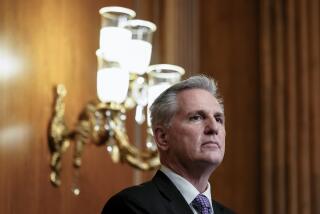Extended Jobless Aid Threatened
- Share via
WASHINGTON — In one of their first outings on a major economic issue since sweeping this month’s midterm elections, the Bush White House and congressional Republicans managed a deadlock that -- unless broken -- will result in nearly 1 million jobless Americans losing their unemployment benefits starting just three days after Christmas.
A stalemate between the House and Senate and an apparent decision by the White House to remain above the fray spells a Dec. 28 end to the federal government’s “extended benefits” program, which helps jobless workers who have run through their six months of regular unemployment checks with up to 13 weeks of extra payments.
For the record:
12:00 a.m. Nov. 22, 2002 For The Record
Los Angeles Times Friday November 22, 2002 Home Edition Main News Part A Page 2 National Desk 18 inches; 658 words Type of Material: Correction
Unemployment recipients -- A chart in Thursday’s Section A with a story on the possible loss of jobless benefits misstated the number of people receiving aid. A label in the chart said the figures needed to be converted into thousands, when in fact they already had been.
Even under a compromise being advanced -- apparently unsuccessfully -- by Senate Democrats on Wednesday, the extended benefits would run out Feb. 1, making them far less generous than Washington was in the previous two recessions.
For President Bush, who spent much of the fall touting the administration’s concern about joblessness and the weak economy, the political repercussions of ending the benefits could be substantial. Even some senior Republicans acknowledged the program’s demise would make it harder for the president to sell a new round of tax cuts -- especially business tax cuts -- to spur growth.
“It’s unconscionable for us to leave town without fixing unemployment compensation,” said Sen. Arlen Specter (R-Pa.). “The political symbolism of it is just horrendous.”
The drive for a last-minute compromise apparently foundered late Wednesday on the objections of House Ways and Means Committee Chairman William M. Thomas (R-Bakersfield).
Congressional staffers of both parties said Thomas refused to accept any expansion of benefits beyond the narrow provisions of a bill he authored, and rejected Senate appeals to separate the jobless benefits issue from unrelated Medicare provisions included in the House-passed measure.
The Medicare provisions raised the ire of fellow Republican Sen. Charles E. Grassley of Iowa, who is about to become chairman of the Senate Finance Committee and believes the panel has authority over the huge federal health insurance program for the elderly. He was miffed that Thomas did not consult him before pushing the changes.
An aide to Thomas said the California Republican would not comment.
White House officials deplored the breakdown of compromise talks, but asserted that there was nothing that the president, who is in Europe for a NATO summit, could have done.
“We’re disappointed,” said administration economic spokeswoman Claire Buchan. “We’d urged the House and Senate to resolve their differences so they could send the president legislation he could sign.”
Democrats took to the Senate floor to protest the breakdown in compromise talks and the looming end of the benefits program.
“I have to say I think it’s a story right out of Charles Dickens,” said Sen. Tom Daschle (D-S.D.), the Senate’s outgoing majority leader. “Ebenezer Scrooge had a last-minute conversion. I would hope that our Republican colleagues in the House would do so too.”
The demise of extended benefits will come with long-term unemployment at a decade high, one in every five jobless workers now out for six months or more and the number of people dependent on the program rising sharply.
The latest Labor Department figures for the end of October show 798,000 people -- including 113,000 Californians -- collecting extended benefits. But estimates by the Center on Budget and Policy Priorities, a generally liberal Washington think tank, show that number will climb to 825,000 by the end of December.
The center estimates that an additional 90,000 people a week -- or a total of 1.2 million -- will exhaust their regular, state-provided jobless benefits in the first three months of the new year and will be unable to get additional federal aid.
In California, Gov. Gray Davis said this week, more than 300,000 state residents would run out of regular benefits in the first three months of next year.
Lawmakers of both parties warned that the Dec. 28 end of extended benefits will prove particularly painful because the current legislation provides for no phaseout. As a result, jobless workers who are now collecting under the program and believe they have three months of coverage ahead of them will suddenly find themselves without a check.
The cutoff of benefits that seems likely could spell trouble for a politician at any time, but especially during the holiday season. And it would seem to pose a particular risk for Bush.
The president’s father, former President Bush, is widely seen as having clinched his reputation as insensitive to the concerns of ordinary Americans by effectively vetoing benefit extensions twice during the early 1990s recession.
When he realized the political damage he had done at the start of the 1992 election, the elder Bush quickly reversed himself, pushing through three benefit extensions in quick succession and establishing a presidential commission to overhaul the unemployment compensation system. But the efforts were to no avail; the elder Bush lost his reelection bid to Democrat Bill Clinton.
The current president has gone out of his way to avoid the political mistakes of his father, most recently by devoting part of virtually every speech during the fall congressional campaigns to the issues of jobs and the jobless.
Analysts said that in not entering the fray over extended benefits, Bush may be counting on the fact that economic issues played only a minor role in the campaign. They say he may also believe that an emphasis on creating new jobs, rather than taking care of those who lost old ones, will have more political appeal in the coming months.
But the deadlock over extended benefits revealed the kind of fissures between members of his own party that could eventually turn Republican control over both the White House and Congress from an asset to a liability. And the impending cutoff of benefits risks putting Bush’s expected call for new tax cuts, especially for business, in a most unflattering light.
Asked how he would explain the need for new tax cuts to a jobless worker who lost extended benefits, Specter said, “I’m going to say to him: ‘We did you wrong.’ ”
*
(BEGIN TEXT OF INFOBOX)
Jobless rolls
Number of people on extended benefits for week ending Oct. 26 (in thousands)
California -- 113,157
New York -- 62,286
Pennsylvania -- 45,695
Texas -- 45,202
Illinois -- 41,394
New Jersey -- 39,876
Washington -- 38,611
Michigan -- 35,512
Florida -- 32,867
Ohio -- 26,641
More to Read
Get the L.A. Times Politics newsletter
Deeply reported insights into legislation, politics and policy from Sacramento, Washington and beyond. In your inbox twice per week.
You may occasionally receive promotional content from the Los Angeles Times.










